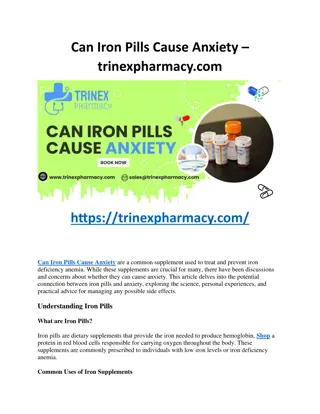
What Painkillers Can I Take With Pregabalin - trinexpharmacy.com
Living with chronic pain can be challenging, and finding the right combination of medications to manage it can make a big difference in your quality of life. What Painkillers Can I Take With Pregabalin, commonly known by its brand name Lyrica, is a medication frequently prescribed for neuropathic pain, epilepsy, Contact : 1 (747) 209 u2013 3649 E-mail : sales@trinexpharmacy.com
Download Presentation

Please find below an Image/Link to download the presentation.
The content on the website is provided AS IS for your information and personal use only. It may not be sold, licensed, or shared on other websites without obtaining consent from the author. If you encounter any issues during the download, it is possible that the publisher has removed the file from their server.
You are allowed to download the files provided on this website for personal or commercial use, subject to the condition that they are used lawfully. All files are the property of their respective owners.
The content on the website is provided AS IS for your information and personal use only. It may not be sold, licensed, or shared on other websites without obtaining consent from the author.
E N D
Presentation Transcript
What Painkillers Can I Take With Pregabalin - trinexpharmacy.com https://trinexpharmacy.com/ Living with chronic pain can be challenging, and finding the right combination of medications to manage it can make a big difference in your quality of life.What Painkillers Can I Take With Pregabalin, commonly known by its brand name Lyrica, is a medication frequently prescribed for neuropathic pain, epilepsy, and generalized anxiety disorder. However, patients often need additional pain relief and wonder, "What painkillers can I take with Pregabalin?" Let's dive into the details to understand the safe combinations and their effects. Understanding Pregabalin What is Pregabalin? Pregabalin is an anticonvulsant and neuropathic pain agent. It works by reducing the number of pain signals sent out by damaged nerves in the body, Shop which makes it effective for
conditions such as fibromyalgia, diabetic neuropathy, spinal cord injury, and post-herpetic neuralgia. How Does Pregabalin Work? Pregabalin binds to calcium channels on nerve cells, About Us which helps to decrease the release of neurotransmitters that send pain signals. This action helps to alleviate pain and can also reduce seizures in patients with epilepsy. Common Uses of Pregabalin Neuropathic pain Fibromyalgia Epilepsy (as an adjunctive therapy) Generalized anxiety disorder (in some countries) Pain Management and Pregabalin Why Combine Painkillers with Pregabalin? While Pregabalin is effective on its own for certain types of pain, it might not be sufficient for all patients. Combining it with other painkillers can provide more comprehensive pain relief, especially for acute pain or breakthrough pain episodes. Types of Pain Pregabalin Treats Pregabalin is primarily used for neuropathic pain, which is pain caused by nerve damage. This can result from various conditions, including diabetes, Blog shingles, and spinal cord injuries. However, it may not be as effective for other types of pain, such as inflammatory pain or pain from acute injuries, which is where additional painkillers come in. Safe Painkillers to Take with Pregabalin Combining Pregabalin with certain painkillers can be safe and effective, provided you follow medical advice and dosage guidelines. Here are some options: Over-the-Counter (OTC) Options Acetaminophen (Tylenol) Ibuprofen (Advil, Motrin) Naproxen (Aleve) Prescription Options Tramadol Codeine
Oxycodone OTC Painkillers Compatible with Pregabalin Acetaminophen (Tylenol) Acetaminophen is a widely used OTC pain reliever and is generally safe to use with Pregabalin. It works by reducing the production of prostaglandins, chemicals in the brain that cause pain and inflammation. Ibuprofen (Advil, Motrin) Ibuprofen is a nonsteroidal anti-inflammatory drug (NSAID) that helps reduce inflammation and pain. When taken in recommended doses, it is usually safe to combine with Pregabalin. However, be mindful of stomach-related side effects. Naproxen (Aleve) Like Ibuprofen, Naproxen is another NSAID that can help manage pain and inflammation. It has a longer duration of action compared to Ibuprofen, making it a good option for longer-lasting pain relief. Prescription Painkillers Compatible with Pregabalin Tramadol Tramadol is a prescription painkiller that works similarly to opioids but also affects serotonin and norepinephrine levels in the brain. It can be safely used with Pregabalin under a doctor's supervision. Codeine Codeine is an opioid pain medication that is often combined with acetaminophen or other drugs. It can be used with Pregabalin, but due to its potential for addiction and side effects, it should be used with caution. Oxycodone Oxycodone is a stronger opioid painkiller used for moderate to severe pain. It can be prescribed alongside Pregabalin but requires careful monitoring due to its high risk of dependency and side effects. Painkillers to Avoid with Pregabalin While some painkillers are safe to combine with Pregabalin, others should be avoided due to the risk of serious side effects.
Specific Drugs and Reasons to Avoid Aspirin: Can increase the risk of bleeding when taken with Pregabalin. Certain NSAIDs (in high doses): May lead to increased side effects such as gastrointestinal bleeding. Other CNS depressants: Drugs like benzodiazepines can enhance the sedative effects of Pregabalin, leading to increased drowsiness and risk of respiratory depression. Potential Side Effects Combining inappropriate painkillers with Pregabalin can lead to adverse effects such as extreme drowsiness, dizziness, respiratory issues, and gastrointestinal problems. Always consult with a healthcare professional before combining medications. How to Take Painkillers with Pregabalin Dosage Guidelines Follow your doctor's dosage recommendations carefully. Typically, painkillers are taken at regular intervals to maintain consistent pain control. Do not exceed the prescribed dosage to avoid adverse effects. Timing and Scheduling Take painkillers and Pregabalin at the same time each day to maintain steady levels in your bloodstream. Your doctor may suggest staggering the medications to reduce the risk of side effects. Potential Side Effects and Risks Common Side Effects Drowsiness Dizziness Dry mouth Weight gain Blurred vision Serious Risks and How to Mitigate Them Respiratory depression: Monitor for signs of difficulty breathing. Dependence and withdrawal: Be aware of the potential for dependence, especially with opioids. Liver damage: Regularly check liver function if taking acetaminophen frequently. Consulting Your Doctor
Importance of Medical Advice Your healthcare provider is your best resource when it comes to managing your medications. They can provide personalized advice based on your medical history and current health status. Questions to Ask Your Doctor What are the risks of combining these medications? Are there any signs or symptoms I should watch out for? How should I adjust my medications if I miss a dose? Are there non-drug options for managing my pain? Managing Pain without Medication Non-Drug Pain Management Techniques Hot and cold therapy Physical therapy Cognitive-behavioral therapy (CBT) Lifestyle Changes Regular exercise Healthy diet Adequate sleep The Role of Diet and Exercise Foods That Can Help with Pain Management Anti-inflammatory foods like berries, fatty fish, and leafy greens Hydration is crucial for overall health and pain management Exercise Routines for Pain Relief Low-impact exercises like swimming and walking Strength training to support muscles and joints Alternative Therapies Physical Therapy A physical therapist can create a tailored exercise program to help manage pain and improve mobility. Acupuncture
This traditional Chinese medicine technique can help relieve pain by stimulating specific points on the body. Massage Therapy Regular massages can reduce muscle tension and improve circulation, aiding in pain relief. Mental Health and Pain Management The Connection Between Mental and Physical Pain Chronic pain can take a toll on mental health, leading to anxiety and depression. Managing mental health is crucial for overall pain management. Techniques for Managing Mental Health Mindfulness and meditation Counseling and support groups Stress reduction techniques Conclusion Combining Pregabalin with certain painkillers can be an effective way to manage chronic pain. However, it's crucial to do so under the guidance of a healthcare provider to avoid potential risks and side effects. By understanding your options and following medical advice, you can find a pain management plan that works for you. FAQs Can I take aspirin with Pregabalin? It's generally not recommended to take aspirin with Pregabalin due to the increased risk of bleeding. Always consult your doctor before combining medications. How long can I take painkillers with Pregabalin? The duration will depend on your specific condition and response to treatment. Follow your doctor's advice and regularly review your medication plan with them. What should I do if I experience side effects? Contact your healthcare provider immediately if you experience any severe or concerning side effects. They can adjust your treatment plan as necessary. Are there any natural alternatives to painkillers?
Yes, there are several natural alternatives such as physical therapy, acupuncture, and dietary changes that can help manage pain without medication. How often should I consult my doctor when taking Pregabalin with other painkillers? Regular consultations are important, especially when starting a new medication combination. Follow-up appointments every few months or as advised by your doctor can help ensure your treatment remains safe and effective. Contact : +1 (747) 209 3649 E-mail : sales@trinexpharmacy.com






















